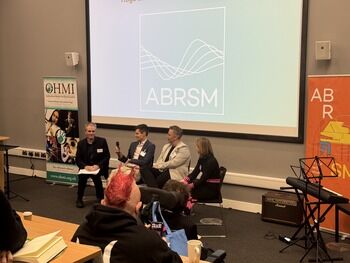University News Last updated 02 April

Concert pianist Nicholas McCarthy has told a conference at 䧣´øÝýË (BCU) that musicians and music engineers must continue to ãthink outside the boxã to ensure instruments can be played by people with physical disabilities.
McCarthy, who was born without his right hand, praised the work of The OHMI Trust and Associated Board of the Royal Schools of Music (ABRSM) to make music more accessible.
Itãs incredible how many lives are being changed by OHMI and the ABRSM,ã said Nicholas.
ãThere wasnãt a lot of adapted repertoires that I could direct disabled musicians to. Now there is a vast amount of learning material that has been created by the likes of OHMI and the ABRSM.ã
Delegates from Australasia, North America, Asia and Europe attended the two-day conference at BCUãs City South Campus ã along with music legend Toyah Willcox.
The 䧣´øÝýË singer-songwriter, actress and presenter, who was born with a twisted spine and grew up with dyslexia, hosted OHMIãs Competition Awards, which are designed to stimulate further and more rapid developments in adapted musical instruments.
ãHaving gone on to build a successful recording career, I know disability can absolutely be a force for creativity,ã she said. ãThe OHMI Trust provides a truly valuable service in helping both disabled children and adults harness that creativity.ã
The conference was also an opportunity to highlight the research that BCU, The OHMI Trust and Imperial College London are conducting into underrepresentation and discrimination within music education and employment.
In the UK, 16.1 million people are disabled, which equates to 24% of the population.ã₤ã₤
In 2020, 80% of disabled people surveyed by national charityã₤Youth Musicã₤said music making was a positive experience. However, 52% could not find a teacher to meet their needs, 25% didn't know how to source an adapted instrument, and 67% cited financial reasons as a barrier to access. In addition, 27% of music hubs questioned didnãt offer adapted equipment for loan.ã₤ã₤
ãWe founded OHMI (One Handed Musical Instrument) in 2011 after a child went into school and was told she could not play a musical instrument because she had cerebral palsy,ã said Rachel Wolffsohn, General Manager of the 䧣´øÝýË-based charity.
ãItãs very excluding to not be able to take part in an activity you want to just because your hands or arms may be different.
ãThatãs the difference we want to make. We want to give everyone the opportunity to participate with their peers in music making.ã
The conference featured exhibitions of various modified instruments, seminars on a variety of topics, as well as discussions on increasing music accessibility.
ãWe have been exploring ways of disseminating information to allow us to have a global increase in creators of adapted musical instruments,ã said Wolffsohn.
McCarthy, who showcased the brand new one-handed piano pieces developed by the ABRSM for Performance Grades 1-5, said he had been encouraged by what he had seen and heard.
ãThe main thing is collaboration and conversation between different musicians and music engineers who all think outside the box when it comes to adapting an instrument,ã he said.
ãThis conference has been a ground for those conversations.ã